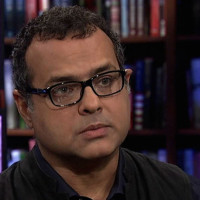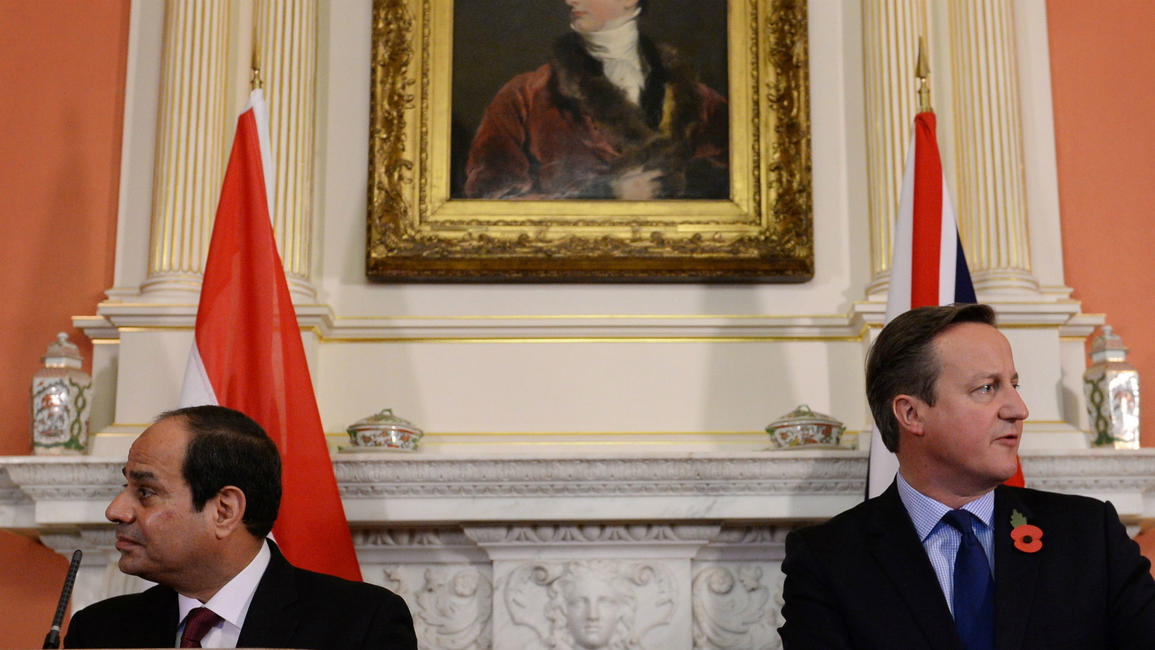
Generals of Generals: Sisi in London
For Alaa abd el-Fattah, and those in prison with him.
Abdel Fattah al-Sisi, Egypt's president, was greeted effusively by the Conservative government of David Cameron.
"The stronger our working relationship, the more able we are to have necessary and frank discussions on areas on which we disagree," said Downing Street.
They disagree on nothing.
The test of the unison of the Egyptian deep state and Western interests was revealed in the US State Department cables released by Wikileaks.
Under Mubarak, said the US Embassy in Cairo in 2009, "Egyptian democracy and human rights efforts" have been "stymied". Should the US do more to promote democracy? Not really, because any such promotion, the Egyptians argued would "result in empowering the Muslim Brotherhood".
The US worried less about human rights in Egypt and more about US Congressional action to make military aid to Egypt conditional on human rights. The Egyptians, meanwhile, believed that their annual levy of $1.3 billion from Washington to the military should come without strings.
The US government eventually agreed with the Egyptians. The Egyptian military had repeatedly told the US that this money - over $40 billion over the years to date - is "untouchable compensation" for the 1979 Camp David peace treaty with Israel.
In another cable from 2009, the US embassy in Cairo said that this money "supported peace between Egypt and Israel". The US essentially paid the Egyptian military to promise not to threaten Israel and to squeeze the Palestinians in Gaza by shutting down the Rafah crossing.
Taking the Egyptian army off-line allowed Israel to have free reign over the Palestinians. No regional military has the scale of the Egyptians to protect Palestinians from the asymmetrical Israeli bombardment.
What benefits to the US comes from the annual bribe and from the blind eye to the Egyptian state's human rights violations? "Egypt remains at peace with Israel and the US military enjoys priority access to the Suez Canal and Egyptian airspace."
| When the people came onto Tahrir Square, the US did not support them |
When the people came onto Tahrir Square, the US did not support them.
It sent its old bagman, Frank Wisner, to tell his old friend Mubarak to make some concessions.
The pillars of US power in the region are Egypt, Saudi Arabia and Israel. None of them could be threatened.
The Carter Doctrine of 1979 provides Saudi Arabia's royal family with a guarantee that the US military will use its full military might to protect it from harm. Israel does not require a presidential doctrine for this guarantee.
But Egypt is not on the same footing as Saudi Arabia and Israel. Mubarak was expendable, but the pillar of stability was not to be knocked down.
Field Marshal Tantawi came to Washington. A deal was struck. The military would set Mubarak aside and create a "Guided Democracy" - the deep state would allow a democratic election, but it would not allow the government to substantially change the statutory order.
The Muslim Brotherhood's Morsi was anathema to the pillars of stability. He went to Tehran, which annoyed the Saudi royal family. He was close to Qatar and, by fraternal relations, with Hamas.
The West was not repelled by Morsi's long leash to the Brotherhood, or his attempt to foist the Brotherhood agenda on the Egyptian people. What bothered them was that he trampled on Egypt's role as the linchpin of US power. If he had governed without the allowances of the pillars of stability, he might have been allowed to finish out his term.
The "democratic" honeymoon was over. Guided democracy required another actor to take the stage.
General Sisi is portrayed as a humble man, born in the bazaars of Cairo, raised making traditional furniture, grown into his own as a career military officer. It is the myth of the man of the soil. He loves his Egypt and would do anything to save it. He is the reluctant president.
There is more to this man than that story. The UK is not alien to him. In the early 1990s, Sisi trained at the UK Joint Services Command and Staff College. A decade later, he spent time at the US Army War College.
Such visits allowed Sisi to make close connections with the military brass across the Atlantic. At the Army War College, Sisi wrote an important paper on Democracy in the Middle East. Democracy will need to be built slowly.
"Regime populations," he wrote, "need to be prepared to assume a participatory role in a democratic form of government. This will require time to educate the population as well as develop the democratic processes that will enable democracy to gain traction."
As we wait for the correct moment, Sisi suggests, a guided democracy would have to make do.
Modernisation Theory remains au courant in the world of elite development specialists and at the old army colleges. One special branch of Modernisation Theory is greatly beloved among army men of a certain generation in "the Global South" - Military Modernisation.
The theory suggests that in countries such as Egypt and Pakistan, capable institutions to properly drive a modernisation agenda are lacking. The only institution with modern capabilities is the military. Therefore, the military should be the one carrying the burden of modernisation.
This is the view held by those around Sisi. They share this with their counterparts in the West - whether in London or Washington. That is why the West is not eager to condemn military coups from Thailand to Honduras. In fact, it prefers them. Sisi is not anathema. He is the ideal type.
But Sisi is not merely the epitome of Military Modernisation. He has his hands out to uphold the two other - more important - pillars of US power in the region: Saudi Arabia and Israel.
| When Sisi overthrew Morsi, Saudi money flooded into Egypt |
When Sisi overthrew Morsi, Saudi money flooded into Egypt. It is what allowed the new government to survive despite the hypocritical snubs from the West (who make noises in public, but shake hands firmly in private).
The West stakes a great deal on the Cairo-Riyadh alliance. In one of the 2009 cables, the US embassy in Cairo wrote, in relief, "for the moment the Egyptian-Saudi moderate camp is holding".
That the US sees this as a moderate camp is telling. The enemy is Iran. Anything that opposes Iran is moderate. Its own character is irrelevant. One of the Saudi cables released by the Egyptian website Mada Masr shows the Saudi monarchy incensed by the presence of Shia students at al-Azhar.
Such concern would find sympathetic ears in Washington, which has played the sectarian game as strongly as the Saudis. Sisi was the Egyptian military attaché in Saudi Arabia. He is a reliable man.
So reliable indeed, that Egypt, for the first time in its modern history, voted for Israel in the United Nations. Admittedly the vote was for Israel to be a member of the UN Committee on the Peaceful Uses of Outer Space Affairs.
As a return gift, Cameron vows to go after religious schools in the UK, with his eye fixed on the schools putatively linked to the Muslim Brotherhood. Both Sisi and King Abdullah would like that. It will come just before Cameron's trip to Saudi Arabia. He's a reliable man too.
Vijay Prashad is a columnist at Frontline and a senior research fellow at AUB's Issam Fares Institute of Public Policy and International Affairs. His latest book is The Poorer Nations: A Possible History of the Global South (Verso, 2014 paperback). Follow him on Twitter: @VijayPrashad
Opinions expressed in this article remain those of the author and do not necessarily represent those of al-Araby al-Jadeed, its editorial board or staff.




